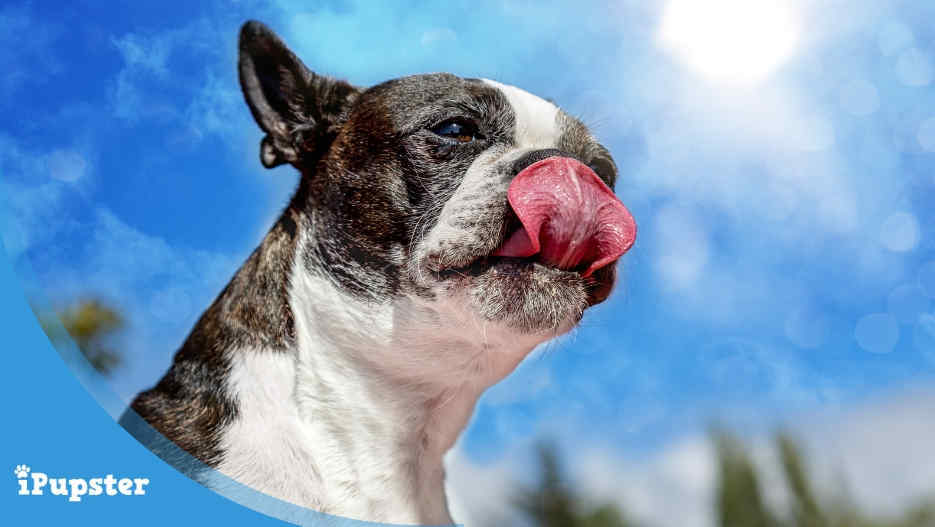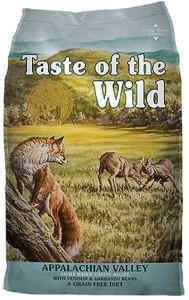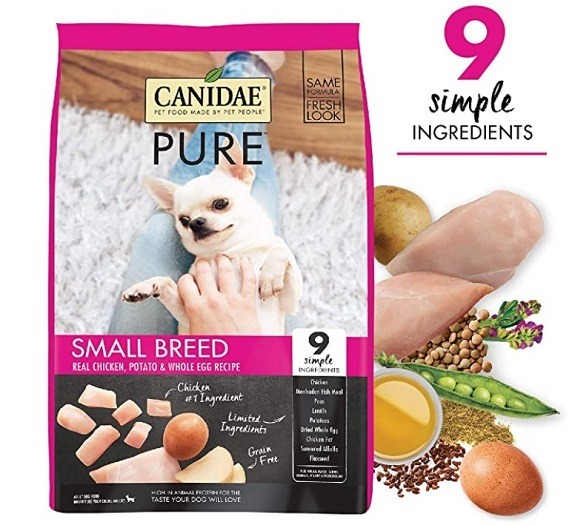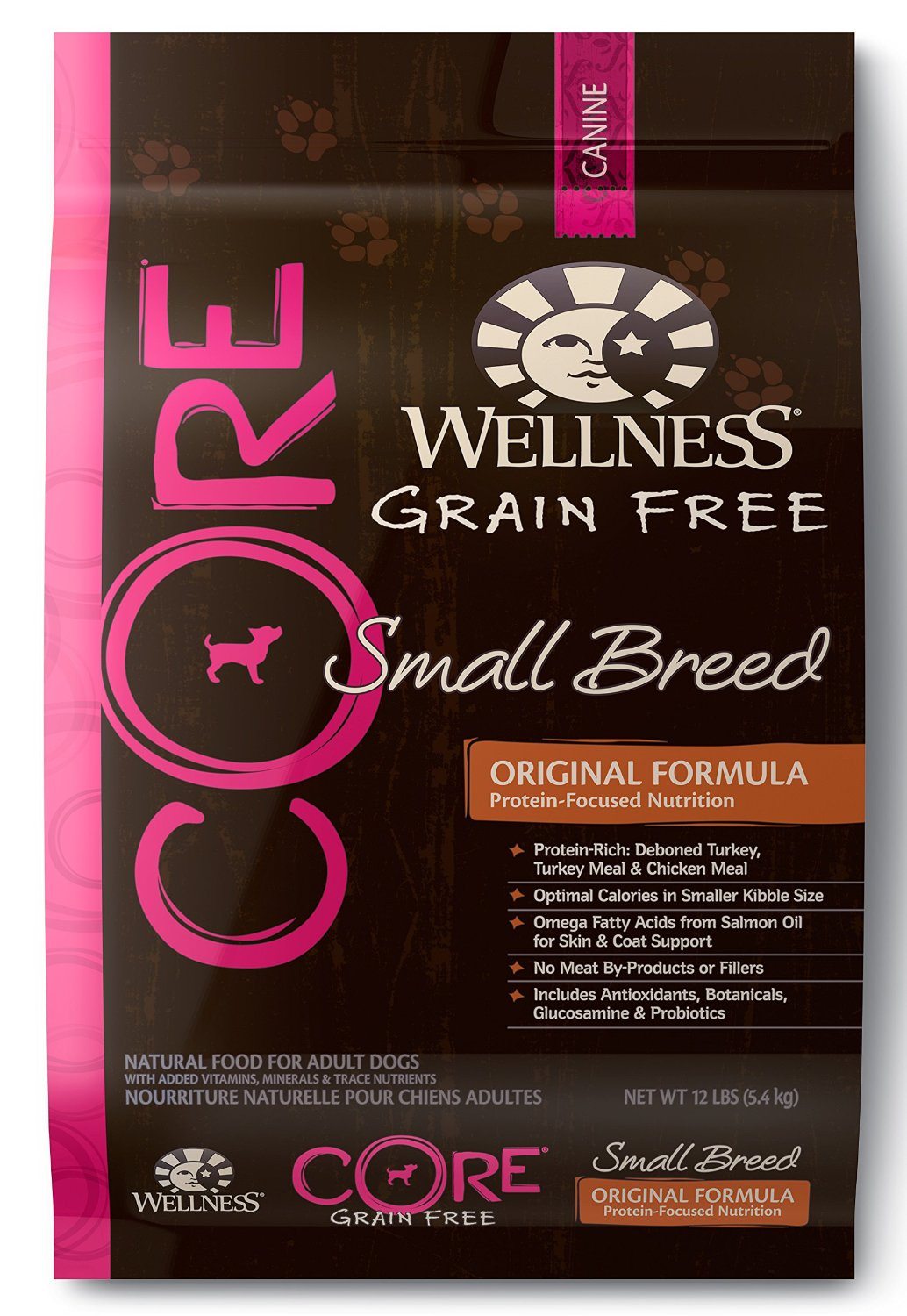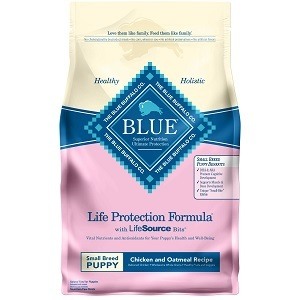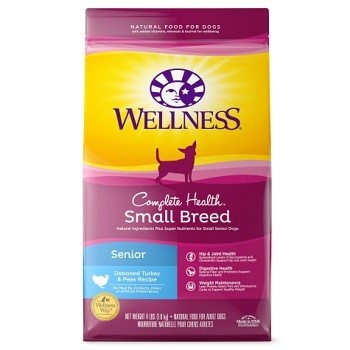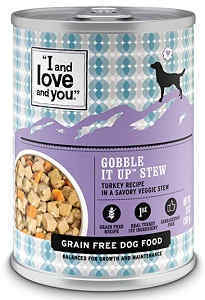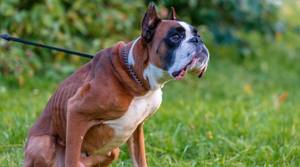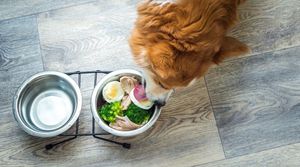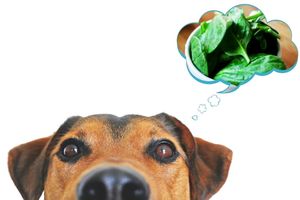A small dog's nutritional needs are rather different to those of their larger counterparts. Take the time to research each food option, and in particular the nutritional value of the food. Account for your dog's smaller size, energy levels and age when choosing a commercial dog food.
If you aren't sure about which food is the best one, here's a comprehensive guide to healthy small dog nutrition and several commercial options to consider.
Best 6 Small Breed Adult, Puppy and Senior Dog Food (Dry & Canned)
First Five Listed Ingredients: Venison, Lamb Meal, Garbanzo Beans, Peas, Lentils.
A smaller dog usually has a faster metabolism than a larger pup, so ensuring that their caloric needs are met is important as ensuring they get all the right nutrients. They also tend to have rather sensitive stomachs, and so often a dog food that is grain laden can be harder for them to digest.
Taste of the Wild Appalachian Valley Small Breed Grain-Free Dry Dog Food is, as the name suggests, free of any grains and has been formulated to be easy on smaller stomachs.
The primary protein included in this formula is venison, a meat that would have been a staple of the diets of many small dogs hunting ancestors. Other protein sources also mimic that diet and include lamb, duck and ocean fish. Notably this kibble has plenty of fiber and easy digestible carbohydrates.
Great dog foods are usually a combination of both meat and fruits and vegetables and this small breed no-grain kibble is no exception. It offers tomatoes, blueberries and raspberries, all of which are rich in essential antioxidants and dried chicory root is a great source of probiotics that provide excellent digestive support.
Furkids to love the taste and is well tolerated by pups who have had previous digestive issues with other formulas.
We also love the fact that it is very reasonably priced when compared with other high quality dog foods.
First Five Listed Ingredients: Chicken, Menhaden Fish Meal, Peas, Lentils, Potatoes.
For small dogs - who have much smaller stomachs than their large breed cousins - sometimes a dog food that offers too many different ingredients can be very hard for them to tolerate well.
CANIDAE Grain-Free PURE Fields with Chicken Small Breed Limited Ingredient Diet Dry Food makes use of a limited number of high quality ingredients to help combat this problem while also providing small dogs with all of the essential nutrients they need.
This kibble is free of gluten, grains, antibiotics, hormones, corn, wheat or soy and is perfectly sized for smaller mouths.
The primary protein in this grain free food is chicken and in fact the formula makes use of just nine ingredients - Chicken, Chicken Fat, Menhaden Fish Meal, Dried Whole Eggs, Lentils, Potatoes, Peas, Alfalfa and Flaxseed - making it easier for pet parents to ensure it contains nothing their small dog might be allergic to.
These ingredients also offer all the protein, good fats and vitamins and minerals small dogs need to thrive.
This premium dry dog food is best for sensitive stomached pups and small dogs with skin allergies since this formula boasts fewer ingredients than many others yet offers optimum nutrition. It's also worth checking out some first-hand owner reviews about this recipe on either Chewy or Amazon.
First Five Listed Ingredients: Deboned Turkey, Turkey Meal, Chicken Meal, Potatoes, Peas.
This is another limited ingredient dry dog food that is specially formulated with the increased caloric needs of the smaller dog while also providing them with all of the vitamins, minerals and protein they need.
With its primary ingredients - turkey and chicken - providing lots of natural protein without adding too much unnecessary fat the formula also includes salmon oil, which provides lots of omega 3 fatty acids, amino acids that are essential for joint care and brain health as well as for healthier skin and coat.
The food is also packed with antioxidant rich fruits and fibrous vegetables, including apples, blueberries and kale.
Those who purchased this food for their small breed pup praise this dry dog food for its easy digestibility, its apparent great taste - very picky eaters seem to like it across the board. We find this is a great alternative to Canidae but at a reasonable price.
First Five Listed Ingredients: Deboned Chicken, Chicken Meal, Oatmeal, Barley, Menhaden Fish Meal (Source of Omega 3 Fatty Acids).
If adult small dogs need food that is easily digested you can only imagine how important that is when they are puppies. Blue Buffalo Life Protection Formula Small Breed Puppy Chicken & Oatmeal Recipe Dry Dog Food is formulated to be very gentle on a small breed puppy's developing digestive system while also meeting all of their nutritional needs.
In addition to real chicken, the formula also boasts antioxidant rich apples, blueberries, spinach and kale as well as Blue Buffalo's 'LifeSource Bits', which are, as anyone who has bought any of the Blue Buffalo formulas knows is a kibble like combination of essential vitamins and minerals, and in this case also folic acid and choline plus DHA and ARA fatty acids, all of which are also found in mother's milk and are essential for brain and muscle development in puppies.
This very well reviewed puppy food is praised by small dog pet parents for its digestibility, its smaller kibble size - perfectly sized for little puppy mouths - and the fact their puppies seem to love the taste, in some cases even to the point where their pups have refused to give it up once they were officially adults!
First Five Listed Ingredients: Deboned Turkey, Chicken Meal, Ground Brown Rice, Peas, Ground Rice.
As dogs age their nutritional needs change. It becomes especially important that their food includes ingredients that offer extra protection for their aging joints as well as additional nutrients to help preserve eye and brain health. Wellness Small Breed
This recipe is formulated to meet those needs. In addition to the protein and good fats provided by the organic turkey the formula also offers omega 3 rich flaxseed, for brain health, coat health and joint protection - and is enriched with Glucosamine and Chondroitin, minerals that are essential for maintaining hip and joint health.
Carrots are included, and provide extra lutein for eye health, something that is also essential for senior small dogs.
Pet parents who purchase this food praise it for the fact that is well balanced in terms of calories, which helps with weight control, something that is also very important for maintaining an older pup's health, and that it is very easy to digest.
Most pet parents also report that it seems to make a difference to coat health and for some the Glucosamine and Chondroitin seems to have helped increase joint health as well.
First Five Listed Ingredients: Turkey, Turkey Broth, Vegetable Broth, Turkey Liver, Dried Egg Whites.
Most dogs - especially small dogs - enjoy a diet that includes both wet and dry foods and experts do agree that such a balance is a good idea nutritionally as well. This wet food from "I and Love and You" offers all the nutrients a small dog needs whatever their stage in life.
The primary source of protein is real turkey, an excellent source of lean, high quality protein that also offers a lot of great taste.
Other than that this is a grain-free canned food with no corn, wheat, soy or rice - making it perfect for smaller pups with sensitive digestive systems - but does offer flaxseed for additional omega 3 and omega 6 fatty acids as well as blueberries, which is an excellent source of essential antioxidants and vitamins. In fact, it's packed with fibrous and vitamin-rich real fruits and vegetables like carrots, sweet potatoes, green beans, spinach and pumpkin.
Pet parents who have chosen this wet food for their small dogs praise it for its lack of 'fillers' - being USA made - has no artificial preservatives, flavors or colors - and for its pleasing texture.
Some also rave over the fact that its texture is easier for older dogs to chew and even the pickiest eaters seem to really enjoy its flavor - in fact there are four other yummy stew recipes to choose from - Moo Moo Venison, Lambarama, Cluckin' Good and Beef Booyah - all at an affordable price too.
Nutritional guide for small dogs
What exactly do small dogs really need, and how does it differ from the needs of a larger pup.
Let's take a look....
Caloric requirements in small dogs
It is usually taken as general wisdom that dogs need to consume 30 calories per pound of bodyweight per day. However, most experts agree that for most small dogs that is not quite enough, and that 40 calories per pound of body weight is a better basic guideline.
Why?
Because smaller dogs have higher metabolisms than their larger counterparts, and this means that they expend the energy they derive from the calorie count in their food at a faster rate.
If a small dog is very lively and active its pet parent may have to monitor their calorie intake even closer, as it's more than possible that a very active little dog may even need 45 calories.
As small dogs age and 'slow down' pets parents should consider revising their caloric intake down a little, as excess weight on their small frames can lead to heart and joint problems. When in doubt they should always check with their vet who can help determine just what their unique small pup needs.
Here are the average daily calorie requirement for each lifestage of your small dog.
- A puppy weighing 10 lb and 30 lb at maturity is 990 kcal/day.
- An inactive dog weighing 10 lb is 296 kcal/day, if weighing 30 lb is 674 kcal/day.
- An adult active dog weighing 10 lb is 404 kcal/day, if weighing 30 lb is 922 kcal/day.
- A young adult active dog weighing 10 lb is 436 kcal/day, if weighing 30 lb is 993 kcal/day.
- A senior active dog weighing 10 lb is 327 kcal/day, if weighing 30 lb is 745 kcal/day.
Feeding a small adult dog
A balanced diet for any pup should include protein, carbohydrates, vitamins, minerals and 'good fats'. That however is a much generalized overview, and small dogs do require some specific examples of these basic food groups.
For example, as they grow and mature faster than a larger breed dog it is crucial that they get enough protein to support that growth.
Some pet parents mistakenly believe that protein should be restricted in smaller dogs to prevent kidney issues, but expert opinion is that that is not the case.
It is also a mistake to think that dogs need a diet that is exclusively meat based or exclusively vegetarian. Unlike cats, who are pure carnivores, dogs are natural omnivores, so a balance of meats, fruits and vegetables is the ideal diet for them.
As is the case for humans, dogs - especially small dogs need plenty of vitamins and minerals in their diet to help them thrive. Antioxidant vitamins like A, C, E and many of the B vitamins offer essential protection against free radical damage.
Free radicals are unstable atoms that damage any cell in the body, leading to illness and premature aging, something no pup needs.
Good fats are also an important part of any small dog's diet.
These fats - which are usually classified as Omega 3 and Omega 6 fatty acids but cover a wide range of substances - contribute to the health of everything from a small dog's brain and eyesight to their coat and skin health.
Growing puppies also benefit from folic acid and AHA fatty acid as these help support proper brain and muscle development.
Feeding your small puppy dog
Puppy formulas specifically designed for small breeds have good levels of high quality protein to aid in healthy tissue and organ development, contain higher levels of essential minerals especially calcium, phosphorus, magnesium, zinc and iron, in addition to vitamin D to help develop strong bones and teeth.
Feed him small amounts to begin with since they have smaller stomachs but large appetites.
Experts recommend: four meals a day, reduced to three until six months of age. Thereafter they can be fed the same as adult dogs - two meals per day.
The best option is to use a puppy food that has been properly formulated for small breeds and has a feeding guideline to feed your pup the correct amount of calories.
Feeding your small senior dog
Small dogs are considered seniors by the age of 11.
Because older dogs slow down and are less active, their calorie intake should be decreased. An older pup would be a lot more energetic and healthier if he is not overweight.
The best way to know if your pup is overweight is to look at him and assess him.
- Does he have a potbelly?
- If viewed from above does your dog have a waist?
- Can you easily feel your dog's ribs?
If there is no visible waist, a bit of a pot belly, and a well-cushioned ribcage, your dog is a little on the “chubby” side and it’s best to take action.
With a calorie-controlled pet food your vet can advise you how much to feed him daily. Most pups that look overweight are at least 15 per cent overweight.
Feeding your small obese dog
There have been many scientific attempts at determining which breeds are most prone to obesity. Despite some conflicting results, across all studies, these small dog breeds were at the top of the list:
- Dachshunds
- Pugs
- Pekingese
- Pomeranians
- Scottish Terriers
- Cavalier King Charles Spaniels
- Beagles
- Cairn Terriers
There were also breeds with a reported smaller metabolism which predisposed them to obesity and the Corgi breed was one of them.
Overfeeding is one of the main reasons leading to obesity in small dogs.
Calorie-dense foods and treats are the main culprits. Another lead cause is inconsistent portioning or free-choice feeding. Pet experts recommend weighing out the food in the case of small dog breeds and puppies.
Studies have also shown that a pet’s bowl and scoop size can attribute to a dog’s weight gain. Owners were found overfeeding by simply using a large dog bowl and large scoop. Try swapping these with a smaller bowl and serving scoop to help with your pup’s weight loss.
An overweight small dog not only will put undue pressure on his joints and hips causing joint issues such as osteoarthritis, but studies also show the following health problems: reduced lifespan, cancer, heat intolerance, respiratory difficulties particularly seen in brachycephalic breeds or short faced dogs like pugs and an overall poor quality of life.
If your small dog is overweight your vet will help recommend a calorie-controlled diet and advise you of the target ideal body weight for your pup.
Protein: If your small dog is overweight, we want to preserve muscle mass but lose the fat. So protein remains a key component when considering a weight-loss dog food. Studies show that in order to preserve lean body mass protein levels of 75 grams per 1,000 calories (g/kcal) of food is recommended.
Vitamins, minerals, and fatty acids: Pet experts recommend not to restrict these vital nutrients when restricting calories.
Extra Fiber: Incorporate dog foods with a high fiber content such as: green beans, broccoli, cauliflower, avocado, raspberries, lentils, chickpeas, apples and pears.
Extra Water: A high water content dog food will give your smaller dog a great volume of water without the fat. Choose canned foods or soak kibble in water for a few minutes before serving.
Feeding frequency for small dogs
Although, in general, they actually need to consume more calories than big dogs small dogs have small stomachs, so need to be given several small meals a day, rather than one or two large ones.
Experts recommend looking to your small dog themselves for guidance here.
Some thrive on a 'breakfast, lunch, dinner' schedule while others, especially those with sensitive stomachs and digestive issues - which are very common in small dogs - a four or even five small meals a day may be the ideal.
Final Thoughts on Best Dog Food for Small Breeds
In closing, it's hard to emphasize enough the importance of good nutrition for any dog, small dogs included.
Taking the time to research, and even perhaps experiment, until you find the right high quality small dog food for your pup will always pay off, in terms of their physical health and their happiness in general too.

